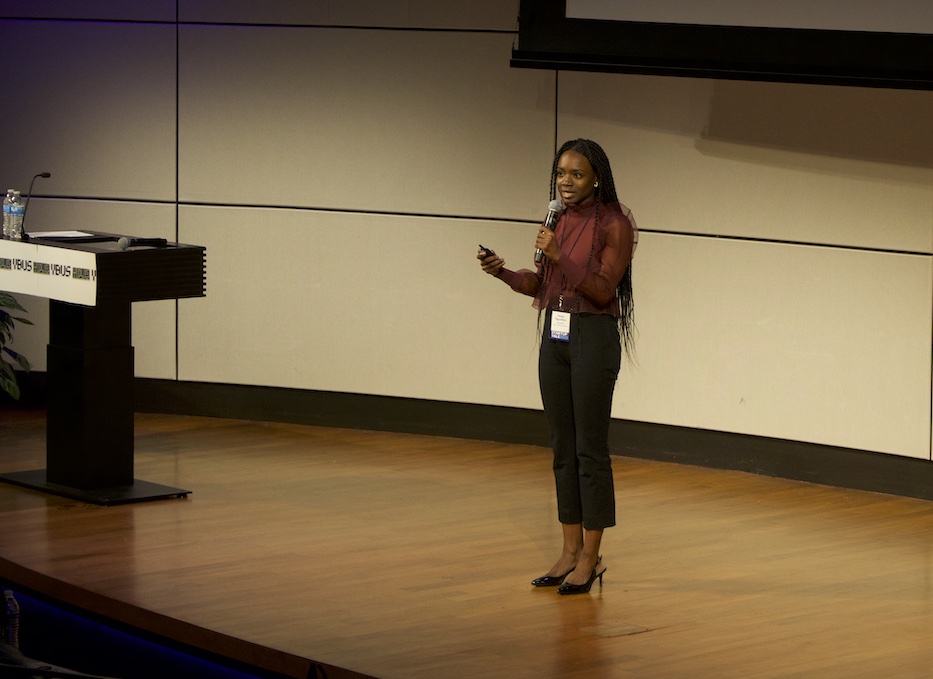
Black-owned businesses | Culture & Community | Economic Development | Arts & Culture
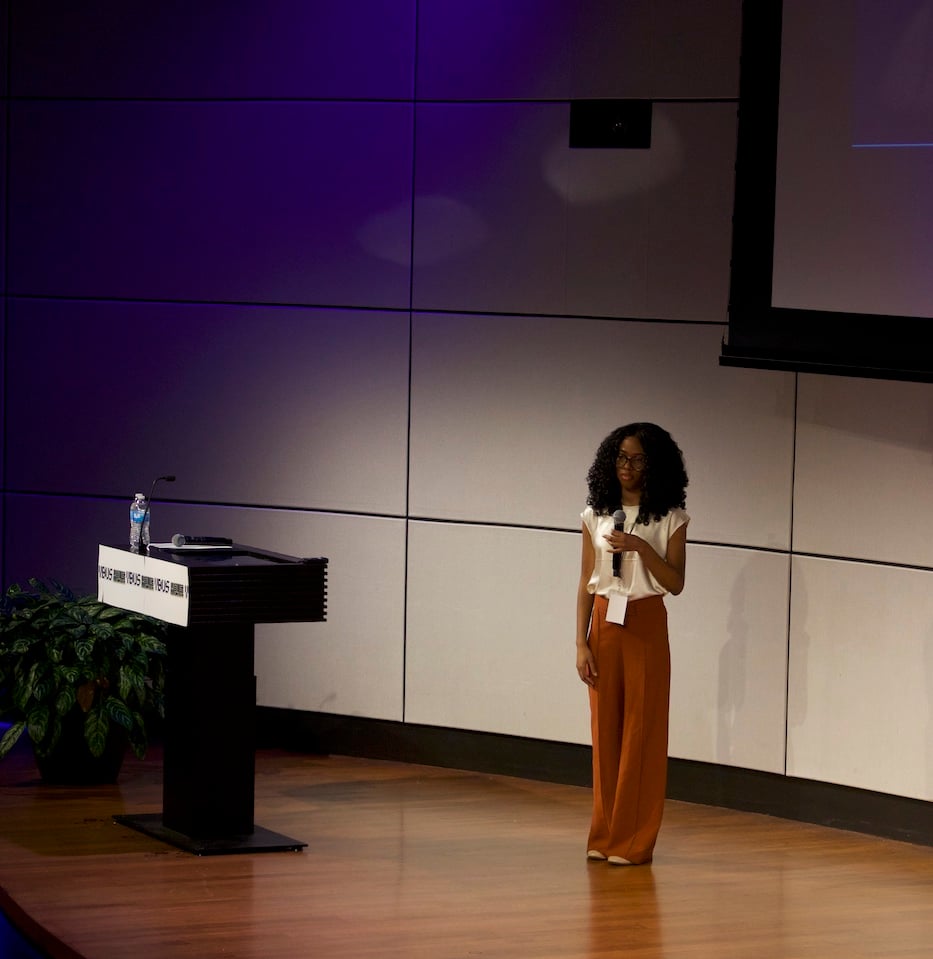
Presenter Kianjai Huggan, who later won the pitch competition. Olivia Charis Photos.
For years, "Jaime" has struggled with visual dyslexia in her classes. At Yale, it’s made it harder for her to keep up, particularly when assignments are heavy on text. Now, a new web-based program focused on educational and digital equity may be here to help.
That’s the idea behind Webquity, a tool that blends inclusivity and innovation from Harvard Innovation Labs’ Kianjai Huggan. Friday, she and hundreds of other business owners, founders, and dreamers gathered at the Yale School of Management (SOM) for the inaugural Yale Black Venture Summit. The event, created in collaboration with the Black Business Alliance, CTNext, Tsai City, and Startup Yale, was designed to highlight the experience of Black entrepreneurs and make entrepreneurship more accessible.
Huggan was one of five competitors—and the ultimate winner—who pitched their venture ideas during the summit’s afternoon pitch competition. The winner received $20,000 in non-dilutive capital, part of an attempt to address the fact that Black founders still receive only one percent of capital funding in the U.S.
“It’s just so nice to see how engaged they are in their own passions and the steps they’ll take to achieve their goals,” said Zanaiya Leon, assistant director at the Office of Inclusion and Diversity at SOM. "It’s beautiful, and it's inspiring."
Applications for the competition were open to any early-stage companies in the Northeast with Black-identifying founders, or those whose project centered a need within Black communities. Each pitch lasted five minutes before entering a five-minute questioning period, where a panel of founders, directors, and brand builders examined competitors' ideas.
The panel included Chandra Roxanne, managing director at Astia Edge; Realist Lab Co-Founder Marie Rocha; The Sadie Collective Co-Founder Fanta Traore; Bullish, Inc. Managing Partner Michael Duda; and TBC Capital CEO Shondra Washington.
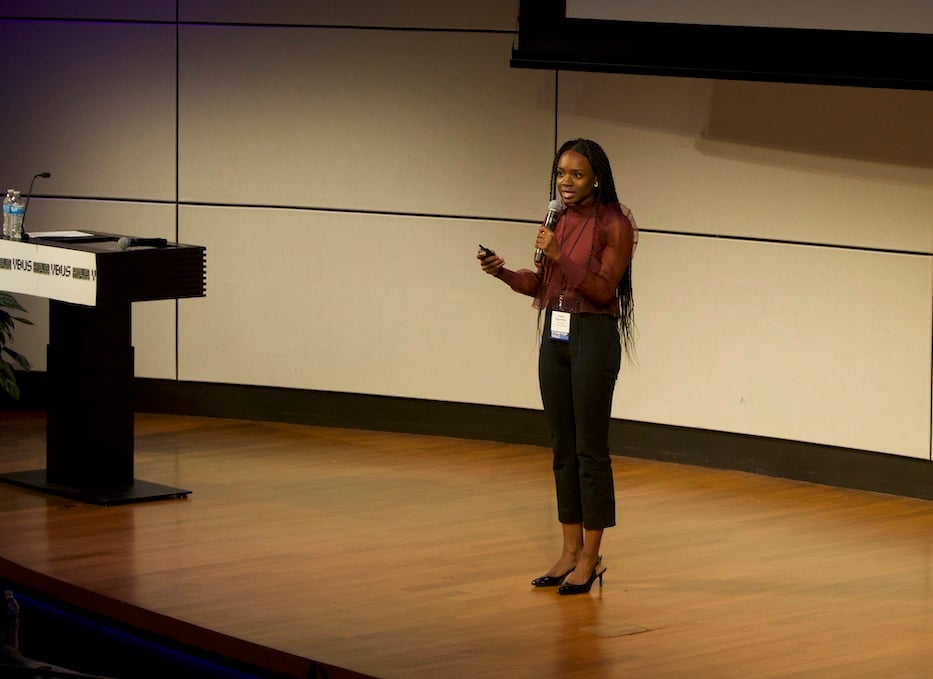
Yinka Ogunbiyi of Halo Braid.
Huggan began her pitch with the story of Jamie, a Black student at Yale who struggles with visual dyslexia, and finds everyday schoolwork more challenging than her peers. Huggan then showed the audience a virtual look inside how visual dyslexia interferes with a student's task of doing a basic web search for a class research project. First the words read normally, but in her next slide they became an inverted, jumbled version of the previously legible Google search.
“If you draw your attention to the red box outline on the screen, you may notice that this could look atypical to what you're used to seeing,” Huggan said. “This gives us an insight into Jamie's experience as a student with visual dyslexia. This presents a problem with educational inequity.”
She described how the lack of accommodation to address such learning needs becomes an additional stressor for students, who are often already stretched thin. She noted how the extensive time and frustration can lead to “decreased confidence” and academic demotivation.
Huggan then displayed the exact same web search again, the image now transformed by the software she and her team at Webquity have created.
Over two billion people globally have impairments that the software can support, she said. Students can personalize settings within Webquity to address their specific learning needs.
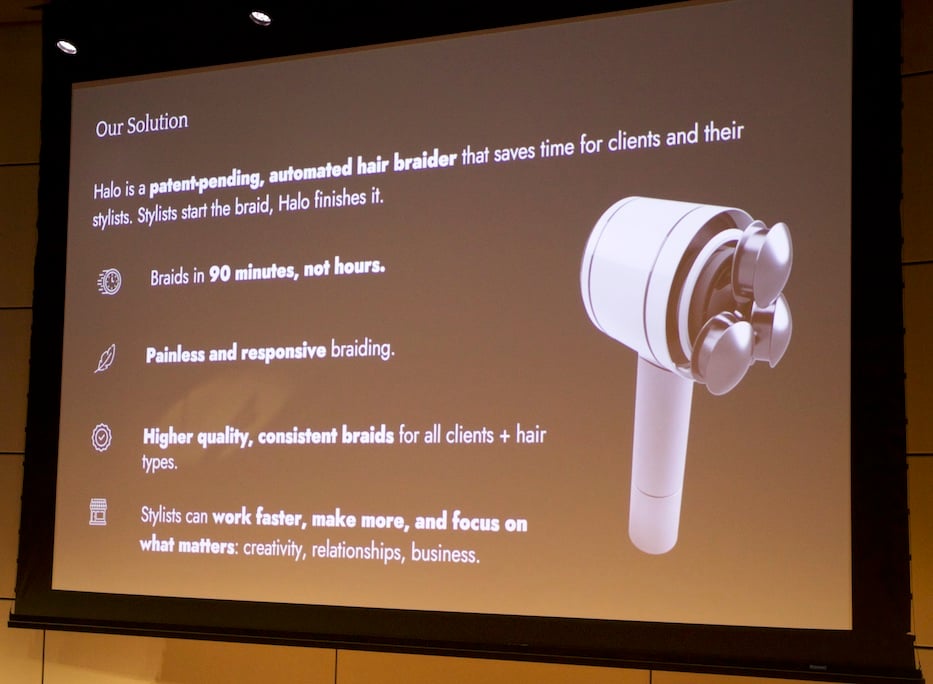
Halo Braid.
Other entrepreneurs focused on efficiency. Halo Braid, the company that won the Audience Choice Award Friday afternoon, was founded by social media influencer and Harvard MBA candidate Yinka Ogunbiyi. Halo solves a problem faced by Black business owners and people alike: the time it takes to braid hair.
Hair braiding can be traced back over 5,000 years in African culture, Ogunbiyi said. And yet within this span of time, the task’s labor and intensity has largely remained the same.
Halo Braid seeks to put an end to the hours of tedious, back-breaking work hair braiders endure, and the time drain it creates for Black women across the world, she said. Halo Braid has patented an automated hair braider that reduces braiding time from hours to minutes.
Ogunbiyi statistics show that Halo has the opportunity to make an $11 billion dollar transformation in the braiding industry, increasing revenue for stylists and time for the consumer.
“They're on their feet for 12 hours a day…They get carpal tunnel, arthritis, cognitive nerve damage in their 30s, and their career revenue is capped by how much labor they can perform,” Ogunbiyi said.
She also noted the need to allow stylists to focus on what is most important to them: “Their creativity, building a relationship and service with their clients and growing their business.”
While the time saved will certainly be beneficial to the stylists, she added, Black women who rely on getting their hair braided throughout the year will have more time to dedicate to their own work.
The Halo braider will be customizable for different hair textures and different braiding styles, with the first prototype focusing on box and knotless braids. The machines will also have removable heads that can be exchanged in between clients for sanitation purposes.
Halo is set to launch their product this summer, with 23 stylists who have signed letters of intent to begin using the device. The funds they accrue will go toward building these final prototypes.
In the future, Halo Braid hopes to sell the braiders to the average consumer as well as open up Halo flagship salons in cities with dense Black populations, Ogunbiyi said.
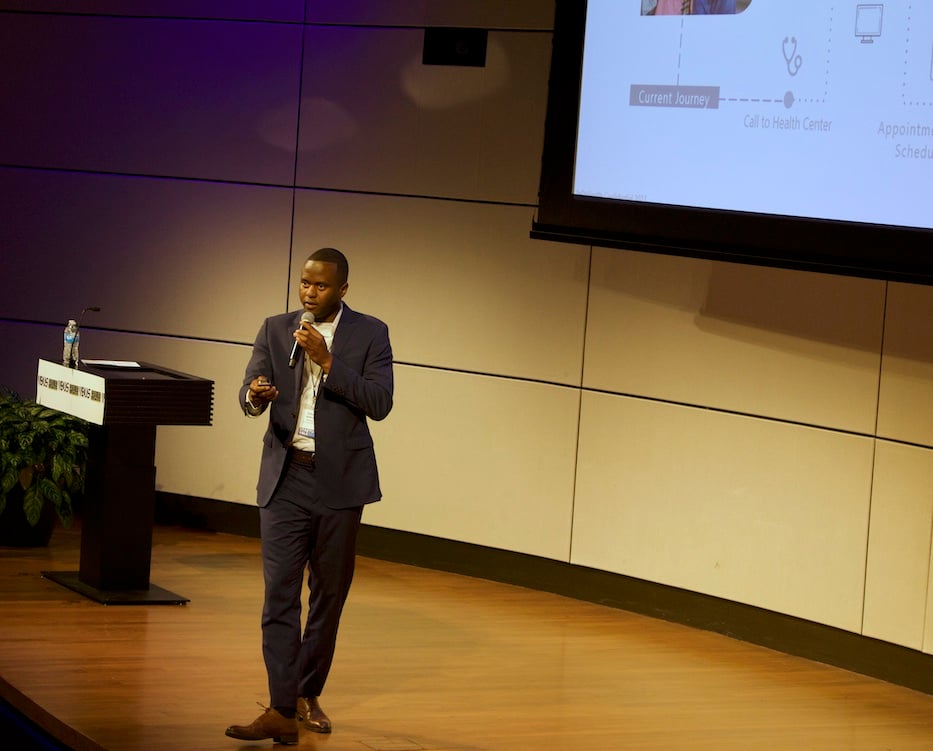
Indehealth Founder Tsikata Apenyo.
Attendees also heard about Indehealth, a patient healthcare information aggregator from first-year Yale MBA Tsikata Apenyo that makes healthcare more accessible and equitable.
Apenyo spoke on his experience as a volunteer at a crisis hotline in college, during which he took a call from a young woman who was suicidal and in crisis, and later took her own life.
“For the longest time, I blamed myself for her death,” Apenyo said.
Still, he explained that there were so many odds set against that young student, including her struggle to access the healthcare she needed at her school. It is an ongoing problem students face, he said. The timing resonates at Yale, where administrators are in the midst of a major lawsuit around student mental health.
“And what's sad about this is that students are in transformational moments in their lives,” he said. “They've just left their families. And we're expecting them to be able to access the U.S. healthcare system that doesn't speak their language.”
This struggle prompted Apenyo to conduct a student survey when he arrived at Yale, asking students about their overall satisfaction with the services they are receiving.
“As somebody who has been in the medical profession, I can tell you, we have amazing healthcare here. But students don't realize that …They live in a different digital age than what the healthcare system lives in.”
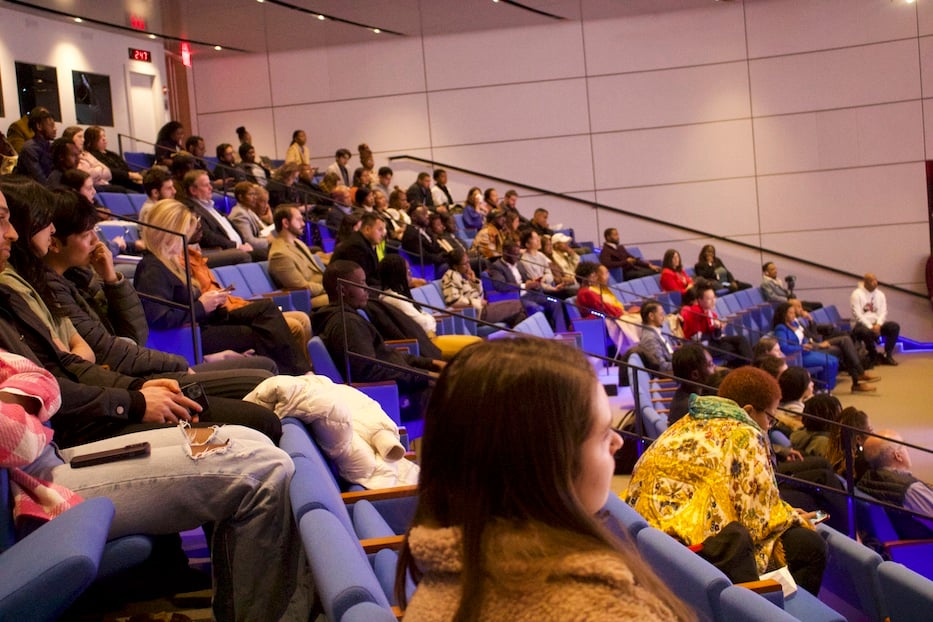
The audience Friday.
Apenyo founded Indehealth to bridge this gap between patient and provider. “We speak the language of students,” he said, describing how the app’s software consolidates all of a patient’s medical history in one place, and allows them to be diagnosed and routed to the appropriate line of care.
It places all healthcare vendors in one place, just as “your mail app aggregates your different email addresses.” In so doing, Indehealth seeks to eliminate gaps in accessibility and equality.
Indehealth wants to be “the glue between the university and the students”, Apenyo added, so that no student is harmed because they did not receive care at the time they needed it most. His ultimate goal is to spread their reach and provide this same bridge for disadvantaged communities throughout America.
“To make healthcare more affordable and equitable for every single person in this country, we need to be ambitious.”
PTH-PATH and Lots of Berries were among the remaining finalists at Friday’s summit. Founded by Yale students Jimmy Carter and Srikar Godilla, PTH-PATH takes Computer Aided Design (CAD) to another level, by using software that increases the efficiency of computer renderings.
Not only is this cost-effective for engineers, the two said—PTH-PATH also simplifies the design process, making it more accessible. Carter and Godilla hope to continue pushing their project forward by sending out PTH-PATH software to local schools to aid in engineering and design education.
Lots of Berries, founded by Yale undergraduate Rakel Tanibajeva, is a sustainable fashion company dedicated to downsizing textile waste. The brand seeks to accomplish this goal by making clothes and fashion accessories out of mycelium, or fungus. The fungi-harvested structure makes fashion items that are durable, biodegradable, and economically accessible.
At the end of the day, Dana Caroll, program specialist at the Office of Inclusion and Diversity at SOM, said the energy of the summit made it so that everyone felt “Inspired to take a chance on [themselves],” and continue dreaming to innovate a world they want to live in.

